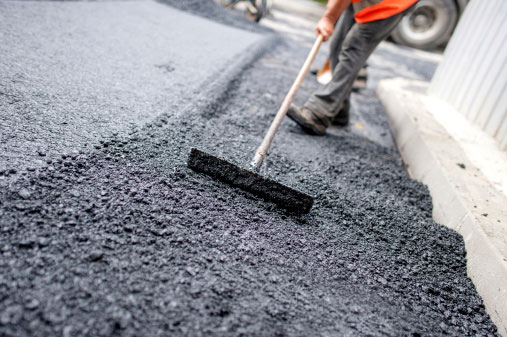Maximize Toughness: Hot Mix Asphalt Sealing for Angled Parking Frameworks
Maximize Toughness: Hot Mix Asphalt Sealing for Angled Parking Frameworks
Blog Article
Hot Mix Asphalt: A Sustainable Remedy for Pavement
Warm Mix Asphalt (HMA) has emerged as a leading sustainable option for sidewalk solutions, supplying a myriad of cutting-edge innovations and environmental benefits. As the need for environment-friendly building and construction practices expands, exploring the nuances of HMA's sustainability can provide beneficial insights right into the future of sidewalk options.
Ecological Advantages of Hot Mix Asphalt

In Addition, Hot Mix Asphalt helps to mitigate metropolitan heat island impacts. Its dark shade takes in sunshine, reducing the amount of warmth reflected back right into the ambience compared to lighter-colored sidewalks. This can lower ambient temperatures in urban locations, lowering the need for air conditioning and eventually reducing power usage.
In addition, Hot Mix Asphalt contributes to boosted stormwater administration. Its permeable nature enables water to infiltrate the pavement and recharge groundwater materials, minimizing overflow and the risk of flooding. These environmental advantages make Hot Mix Asphalt a sustainable choice for paving roadways and freeways.
Power Effectiveness in HMA Manufacturing
Is energy performance an essential consider the production of Warm Mix Asphalt (HMA)? Absolutely. Energy plays a substantial function in the manufacturing of HMA, impacting both expense and ecological sustainability. One crucial facet of power performance in HMA production is the use of cozy mix asphalt (WMA) technologies (hot mix asphalt). WMA enables the mixing and positioning of asphalt at lower temperature levels contrasted to standard hot mix asphalt, causing lowered power consumption throughout manufacturing. This procedure not only decreases gas usage but also lowers greenhouse gas exhausts, making it a much more eco-friendly option.
In addition, improvements in plant innovations have led to more energy-efficient HMA manufacturing procedures. By optimizing energy usage in HMA manufacturing, the sector can minimize its carbon impact while maintaining top notch sidewalk materials.
Recyclability of Warm Mix Asphalt
The recyclability of Hot Mix Asphalt (HMA) is a crucial element of its sustainability and long-term ecological impact. HMA is among the most recycled materials in the USA, with over 100 million lots of recovered asphalt sidewalk (RAP) being recycled yearly in new pavement building and construction. Reusing HMA offers numerous environmental benefits, such as lowering the requirement for virgin materials, lowering energy intake throughout production, and lowering the amount of waste sent to land fills.
The process of recycling HMA includes grating the existing sidewalk, squashing it right web into smaller items, and blending it with new aggregate and asphalt binder to produce a recycled mix. This recycled mix can typically carry out along with and even better than standard HMA, while needing fewer basic materials and sites creating lower greenhouse gas exhausts. By integrating RAP right into brand-new pavement projects, road companies can save natural sources, minimize expenses, and lessen the environmental impact of road building and maintenance activities. Generally, the recyclability of HMA plays a significant duty in promoting sustainable practices within the pavement market.

Long-Term Performance of HMA
Asphalt pavements show durability and resilience over an extensive period, showing the long-lasting efficiency of Warm Mix Asphalt (HMA) Additionally, improvements in HMA innovation, such as the use of polymer-modified binders and warm mix asphalt, have actually even more enhanced the longevity and long life of HMA pavements. By focusing on high quality construction and maintenance practices, HMA proceeds to show itself as a lasting and cost-effective remedy for durable sidewalk infrastructure.
HMA: Longevity and Sustainability
Demonstrating both sturdiness and sustainability, Hot Mix Asphalt (HMA) has come to be a keystone in the construction of long-lasting pavement frameworks - hot mix asphalt. HMA's durability stems from its capability to stand up to heavy lots, severe weather, and high traffic volumes, making it a trustworthy selection for roads, highways, and airport runways. The composition of HMA, which commonly consists of aggregates, binder, visit this site right here and filler, plays an essential function in enhancing its long life and resistance to deterioration
Additionally, HMA's sustainability hinges on its recyclability and energy-efficient production procedure. The ability to recycle reclaimed asphalt sidewalk (RAP) in new HMA blends decreases the need for virgin materials and decreases the environmental effect of pavement building and upkeep. Additionally, the energy efficiency of generating HMA hinges on its reduced mixing temperatures compared to various other pavement materials, causing minimized power intake and greenhouse gas emissions.
Conclusion
In conclusion, warm mix asphalt (HMA) uses a sustainable option for sidewalk with its environmentally friendly characteristics. HMA's recyclability, power performance in production, and long-lasting sturdiness make it a green choice for roadway building.
HMA is one of the most recycled products in the United States, with over 100 million bunches of reclaimed asphalt sidewalk (RAP) being recycled every year in brand-new sidewalk building.The process of recycling HMA involves milling the existing sidewalk, crushing it right into smaller pieces, and mixing it with new accumulation and asphalt binder to produce a recycled mix.Asphalt pavements demonstrate toughness and strength over a prolonged period, mirroring the long-term efficiency of Hot Mix Asphalt (HMA) Furthermore, improvements in HMA modern technology, such as the use of polymer-modified binders and warm mix asphalt, have even more improved the resilience and long life of HMA pavements. The capability to reuse redeemed asphalt sidewalk (RAP) in new HMA mixes minimizes the need for virgin materials and minimizes the ecological impact of sidewalk building and construction and upkeep.
Report this page